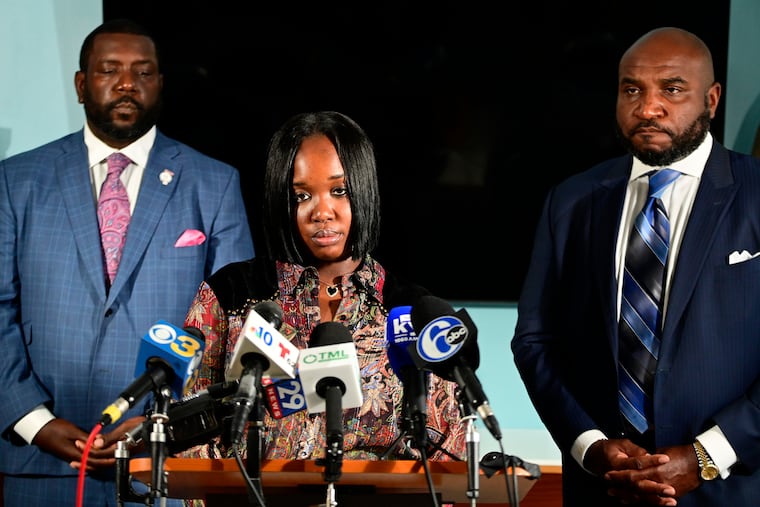Pair a police misconduct payout with the new police contract, and you’ll see how little has changed | Helen Ubiñas
The police contract only counts as “police reform” if toothless reckonings are your jam.

If you were wondering how the national reckoning on policing is going in Philadelphia, you wouldn’t have to look much further than two stories on The Inquirer’s website this week.
On one side of the homepage was the story of a Philadelphia mother, Rickia Young, who settled with the city for $2 million after police bashed in her car windows, dragged her and a 16-year-old family friend from her SUV during last October’s protests, and then had her traumatized 2-year-old son used by police as a prop to lie.
Right next to it was the story of the new Philadelphia police contract that mostly adds up to a nice payday for cops — the three-year contract increases police spending by $133 million. The rest of it only counts as “police reform” if mostly toothless reckonings are your jam.
Every Philadelphia resident should read the document, but if the malignant buffoon who heads the Fraternal Order of Police Lodge 5 and regularly and rigorously defends the indefensible is more than good with the contract, then you know we’re in trouble.
The FOP even took to Twitter to brag about its wins:
$1,500 bonus!
No change in residency!
Discipline grievance and arbitration rights 100% protected!
No police oversight commission changes without consent of FOP!
“I think it’s a fair deal for both sides,” said FOP president John McNesby.
Of course he does, because the new contract does little to revoke the Get-Out-Of-Jail-Free! card baked into the police arbitration system, which an Inquirer investigation found allows officers accused of wrongdoing to get their punishments reversed or lessened.
Oh, and remember all that talk last year in Philadelphia and Harrisburg of reforming Act 111, the state law that limits the ability of municipalities to manage police?
Yeah. Guess we’re not doing that.
“It’s a beginning,” Mayor Jim Kenney said at a news conference. “What we were able to accomplish within the confines of that state law, I think, is exceptional.”
Exceptionally convenient, maybe, because lawmakers can continue to blame the system they help uphold to explain the lack of meaningful reform a year after people across the country, including in Philadelphia, took to the streets after George Floyd died under the knee of a Minneapolis police officer. The new contract will allow people other than officers to be more involved in the department’s disciplinary process, but details are sparse. The contract also calls for a ban on officers fraternizing with hate groups — which I assume includes giving the Proud Boys a warm welcome at FOP headquarters. But it’s unclear how that would be enforced.
Meanwhile, taxpayers continue to foot the cost of injustice. (You didn’t think police officers would actually be held accountable for their bad behavior by having to actually pay out of pocket for it, did you?)
Police and police apologists love to hide behind and explain away police brutality in the gray areas: Hey, man, it’s a cop’s word against a civilian’s. Who you gonna believe? Why wouldn’t they just comply?
But there was no gray area in the videos that were shared widely on social media of what occurred in the early morning hours of Oct. 27, hours after two Philadelphia police officers fatally shot Walter Wallace Jr., a 27-year-old Black man who relatives said was experiencing a mental health crisis that afternoon and lunged toward police while wielding a knife.
After driving to West Philadelphia to pick up her friend’s teenage son, Young was headed down Chestnut Street toward 52nd Street when she encountered protesters, including some agitators who were throwing debris at police.
She tried to make a U-turn, only to be swarmed by cops who beat her to the ground and carried her son away.
Shortly after the incident, the national Fraternal Order of Police posted a photo of a Philadelphia officer clutching the toddler alongside a story that claimed the boy was lost during “violent riots” and saved by police.
“We are not your enemy,” read the caption on the photo that was later deleted. “We are the Thin Blue Line. And WE ARE the only thing standing between Order and Anarchy.”
Young’s mother later found the toddler miles away with officers in a cruiser, without his hearing aids and with broken glass shards in his hair.
Two officers were fired in connection with Young’s incident and 15 more are awaiting internal disciplinary proceedings.
Some might call that a win. Progress, even. But it is progress in the way that the conviction of the police officer who murdered George Floyd was justice.
True justice would have been a complete overhaul of a broken and racist system after the momentum of a year of nationwide protests.
Justice would mean that the power of that system didn’t continue to write its own rules under the guise of progress.